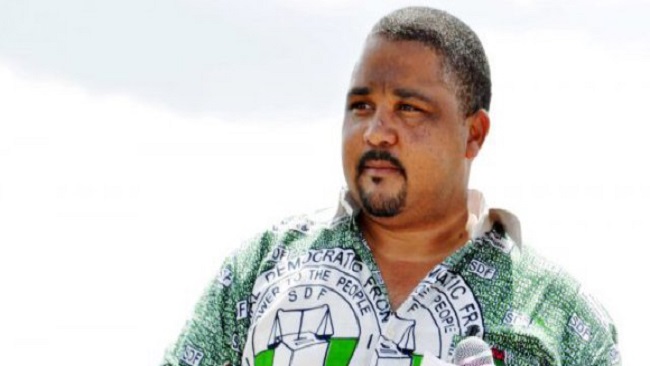Corrupt Fru Ndi acolyte elected president of SDF
Joshua Osih was elected Sunday, October 29, president of the Social Democratic Front (SDF), said this party, which is one of the two main opposition movements in Cameroon, a country led unchallenged for more than forty years by Paul Biya.
Mr. Osih, 54, until then first vice-president of the party, succeeds John Fru Ndi, who died on June 12 after having chaired the SDF since its creation in 1990. The SDF is the first opposition movement represented in the National Assembly with 5 seats out of 180 in a chamber largely dominated by the party of President Paul Biya. At 90 years old, the latter is regularly accused by the UN and international NGOs of repressing the opposition in this vast Central African country of nearly 30 million inhabitants.
Mr. Osih was elected with 62% of the votes of SDF activists gathered in congress against two other candidates, Jean Takougang, member of the party’s electoral commission, announced to AFP. John Fru Ndi had long been the main opponent, very close to winning the presidential election in 1992 with nearly 36% of the vote against nearly 40% for Mr. Biya. But in recent years, the SDF has lost ground, going from 43 deputies in 1997 to only 5 in 2023.
“Violation of human rights”
During the 2018 presidential election, the SDF recorded the worst score in its history, with Joshua Osih receiving only 3.35% of the vote. It was the Cameroon Renaissance Movement (MRC) which then positioned itself as the leading opposition party, its leader Maurice Kamto winning 14.23% of the vote against 71.28% for Mr. Biya.
In June, Amnesty International accused the government of “violation of human rights”in particular by imprisoning “arbitrarily” opponents, civilians, journalists, civil society leaders and by having them judged by military courts, invoking acts of “terrorism”.
Mr. Kamto was imprisoned for nine months without trial in 2019 for peaceful protests against the government and was only released after international pressure. The MRC has no elected representatives in the Assembly because it boycotted the 2018 legislative elections.
In 2019 and 2020, nearly 700 MRC executives and activists were arrested like Mr. Kamto, during and after “unquestionably peaceful marches” but “objects of violent repression”, had accused experts mandated by the UN in November 2022. The majority were released after eight months of detention without trial but forty-seven were sentenced to prison in 2021 by a military court. Forty-four are still imprisoned.
Source: AFP




